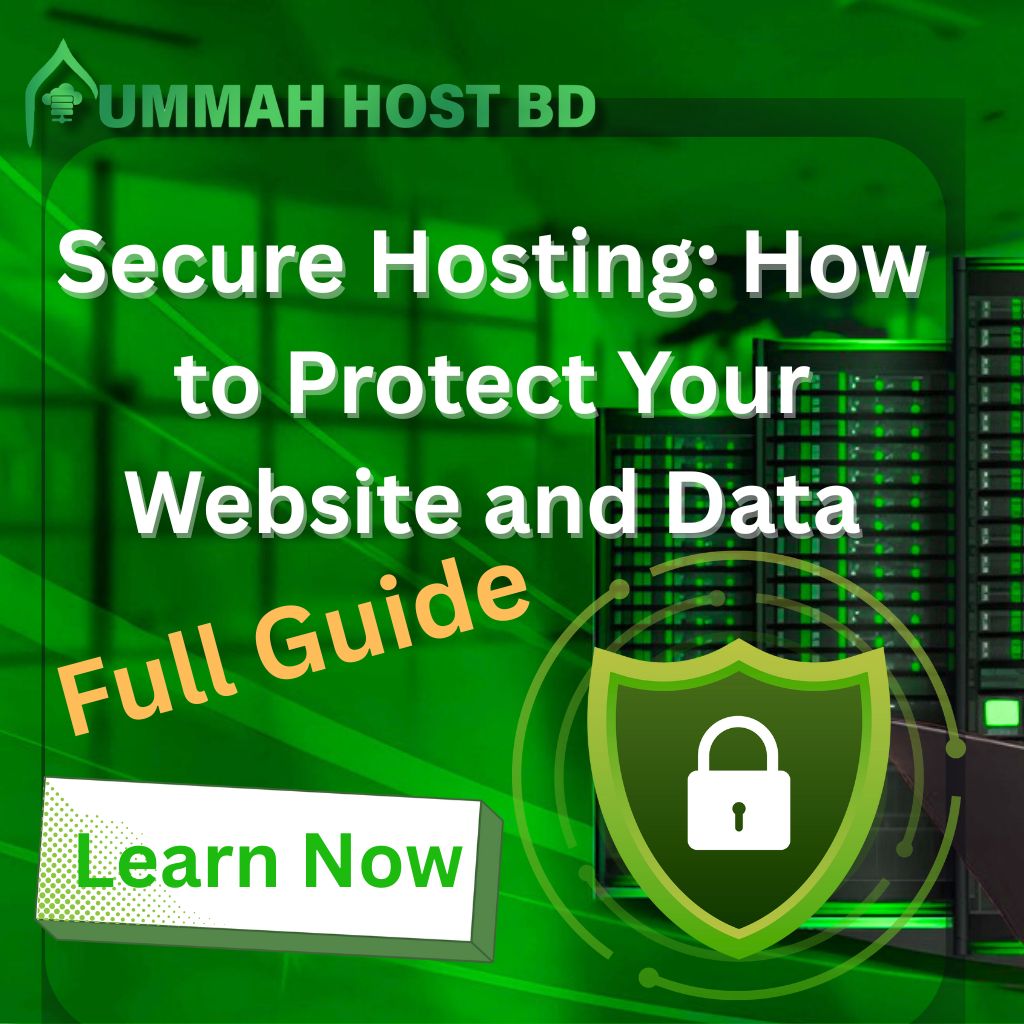
Secure Hosting: How to Protect Your Website and Data
- By Anis Ur Rahman
- 21 Apr, 2025
Why Website Security Matters More Than Ever
You may have already built a website for your business, personal blog, or online store.
But have you ever wondered how secure your website really is?
The truth is, somewhere in the world, a website gets hacked every single minute.
Your site contains valuable information — including customer emails, payment details, login credentials, and even business data — all of which is priceless to cybercriminals.
Without proper protection, your website is like leaving the door open for hackers to walk right in.
In this guide, you’ll learn:
How secure hosting protects your website and data
Which security features actually matter
And how to choose a hosting provider you can truly rely on
What Is Secure Hosting?
Secure hosting means your website is stored on a server protected by multiple layers of security technology.
Think of it as a digital home with strong locks, an alarm system, and a guard at the gate — all working together to keep everything safe.
Regular hosting simply gives your website space on the internet. But secure hosting goes beyond that — it provides active protection against hackers, malware, data theft, and unexpected website crashes.
Here's what makes hosting "secure":
- SSL/TLS certificates that encrypt data between your site and visitors
- Firewalls that block suspicious traffic
- Malware scanning that catches threats automatically
- Regular backups so you can restore your site if something goes wrong
- DDoS protection that keeps your site online during attacks
Check Our Guide On: Domain Security and Protection – Complete Beginner's Guide (2025)
Quick FAQ
Can a website run without hosting?
No. Every website needs to be stored somewhere online.
Is HTTPS 100% secure?
HTTPS encrypts the connection, making it much harder for attackers to steal data. But you still need other security layers like firewalls and malware protection.
Can secure websites still be hacked?
Yes, unfortunately. No security is perfect. But secure hosting makes it extremely difficult and catches most threats before they cause damage.
Core Security Features You Actually Need
Let's break down the security features that matter most.
1. SSL Certificates: Your First Line of Defense
An SSL certificate encrypts data traveling between your website and your visitors. When someone enters their password or credit card number, SSL scrambles that information so hackers can't read it.
You'll know a site has SSL when you see HTTPS (not just HTTP) and a padlock icon in the browser.
Do you need an SSL certificate?
Absolutely.
An SSL certificate is essential for improving your Google ranking and building customer trust.
Most secure hosting providers include a free SSL certificate with every hosting plan.
2. Malware Protection and Scanning
Malware is malicious software designed to damage your website or steal data. It can redirect visitors to fake sites, steal customer information, or get your site blacklisted by Google.
What protects websites from hackers?
Modern secure hosting typically includes:
Real-time malware scanning — checks your files daily for threats
Automatic malware removal — immediately removes any detected threats
Website firewall (WAF) — blocks malicious code and unauthorized access attempts
In the first half of 2024, SiteCheck scanned a total of 53,234,574 websites. Among them, 681,182 sites were found infected, and 101,819 sites contained blacklisted resources.
This data highlights why professional hosting and regular security monitoring are essential for every website.
3. Backup and Restore Services
Imagine waking up one morning only to find your entire website — and all its data — completely gone!
Sounds shocking, right? But such incidents happen more often than you think.
That’s why cloud backup and recovery services automatically store a complete copy of your website.
If a disaster strikes, you can restore everything with just a few clicks — ensuring your business never goes offline for long.
Look for hosting that offers:
- Daily automatic backups (at minimum)
- Multiple backup copies in different locations
- One-click restore
- At least 30 days of backup history
Read Our Best Guide: Backup in Hosting Services – Complete 2025 Guide to Protect Your Website
4. Firewall and DDoS Protection
A firewall acts as a security guard for your website. It examines every request and blocks anything suspicious.
DDoS attacks flood your website with fake traffic, overwhelming your server until real visitors can't access your site.
Quality secure hosting includes:
- Web Application Firewall (WAF)
- DDoS mitigation that absorbs attack traffic
- IP blocking for known malicious sources
- Rate limiting to prevent brute-force login attempts
5. Two-Factor Authentication (2FA)
Your hosting account is the key to your entire website. If someone gets your password, they control everything.
Two-factor authentication adds a second security layer. Even if hackers steal your password, they can't log in without a code sent to your phone.
How to protect hosting accounts with 2FA:
1. Enable 2FA in your hosting control panel
2. Download Google Authenticator or Authy
3. Scan the QR code to link your account
4. Save backup codes in a secure location
It takes 10 seconds longer to log in, but it makes your account exponentially harder to hack.
Understanding Different Hosting Types and Their Security
Shared Hosting vs VPS Security
Shared hosting means your website shares a server with dozens of other websites. It's like living in an apartment building.
VPS (Virtual Private Server) gives you a dedicated portion of a server, isolated from other users.
Which is safer?
VPS is more secure. Here's why:
Shared Hosting Risks:
- If one website gets hacked, yours could be affected
- Limited control over security configurations
- Other users' bad practices can impact your site
VPS Advantages:
- Isolated environment
- Root access for custom security
- More resources to handle attacks
- Better performance under security load
For small blogs or business websites, secure shared hosting is usually the best choice.
However, for large eCommerce platforms or high-traffic websites, VPS hosting offers better performance and reliability.
Learn More: Shared vs. VPS Hosting: Which is Better for Bangladesh?
Cloud Hosting Security
Cloud hosting distributes your website across multiple servers in different locations. If one server fails, another takes over instantly.
Can the cloud be hacked?
Yes, but it's harder. Cloud hosting often provides better security because of redundancy, automatic failover, and scalable DDoS protection.
The four pillars of cloud security:
1. Data Security – Encryption and access controls
2. Identity and Access Management – Who can access what
3. Infrastructure Security – Server protection
4. Compliance and Governance – Meeting industry standards
Is cloud data private?
It depends on your provider. Reputable hosts like AWS, Google Cloud, and Azure have extensive privacy protections and comply with regulations like GDPR.
Which Type Is the Safest?
Here's my honest ranking:
1. Managed Cloud VPS – Best security, but most expensive
2. Premium Shared Hosting – Good enough for most small sites
3. Budget Shared Hosting – Risky, but acceptable for non-critical sites
WordPress Security: Special Considerations
WordPress powers over 43% of all websites. That popularity makes it a massive target.
Can WordPress Be Secure?
Yes—if you do it right.
The problems come from outdated versions, vulnerable plugins, weak passwords, and unprotected login pages.
How to Secure Your WordPress Website
Basic WordPress Security Checklist:
1. Keep everything updated – WordPress core, plugins, and themes
2. Use strong passwords – Use a password manager
3. Limit login attempts – Install a plugin like Limit Login Attempts Reloaded
4. Hide your login page – Change from yourdomain.com/wp-admin
5. Disable file editing – Add this to wp-config.php: `define('DISALLOW_FILE_EDIT', true);`
6. Use a security plugin – Install Wordfence or Sucuri Security
Explore Our Guide About: WordPress Website Backup & Security – Protect Against Hacks & Data Loss
How to Lock a WordPress Website
Want to make your site completely private?
Options:
- Password-protect the entire site – Use the Password Protected plugin
- Password-protect specific pages – Use WordPress visibility settings
- Restrict by user role – Use Members or User Role Editor plugins
- Use maintenance mode – Show "Coming Soon" while you work
How to Keep a WordPress Domain Private
Your domain registration includes personal information that's publicly searchable.
WHOIS privacy hides your details by replacing them with the privacy service's information.
How to enable:
1. Log into your domain registrar
2. Find "Domain Privacy" or "WHOIS Protection"
3. Enable it (often $5-10/year or free)
Choosing the Right Secure Hosting Provider
What Is the Most Secure Web Hosting Service?
Top-tier security hosting:
1. Ummah Host BD – AI anti-bot system, free SSL, daily backups
2. Cloudways – Dedicated firewalls, automated backups
3. WP Engine – Managed WordPress security, threat detection
4. Kinsta – Google Cloud infrastructure, DDoS protection
What they have in common:
- Free SSL certificates
- Regular malware scanning
- Automatic backups
- 24/7 security monitoring
How to Choose a Secure Hosting Provider
Ask these questions:
1. What security features are included?
2. How often are backups performed?
3. Where are backups stored?
4. What's the uptime guarantee? (Look for 99.9%+)
5. Is support available 24/7?
6. Do they offer DDoS protection?
7. Can I easily restore backups myself?
8. What happens if my site gets hacked?
Benefits for Small Businesses
Small businesses are prime targets because they have less security investment than large companies.
What secure hosting does:
- Protects customer trust – One breach ruins your reputation
- Prevents revenue loss – Keeps your site online and making sales
- Saves time – Professionals handle threats
- Meets legal requirements – GDPR, PCI DSS compliance
- Boosts SEO – Google rewards secure sites
Secure Hosting for eCommerce
Is VPS hosting better for e-commerce?
Yes. VPS offers PCI DSS compliance, better performance, more control, and an isolated environment for customer data.
Minimum security for eCommerce:
- SSL certificate (256-bit encryption)
- PCI DSS compliance
- Regular security scans
- Automatic backups
- Two-factor authentication
- IP whitelisting for admin areas
Consider payment solutions like Stripe or PayPal that handle credit card information on their servers—reducing your liability.
Taking Action: Your Next Steps
Do these today:
1. Check if your site has SSL – Look for HTTPS and padlock icon
2. Update everything – WordPress, plugins, themes
3. Change weak passwords – Use a password manager
4. Enable two-factor authentication – On hosting and WordPress
5. Install a security plugin – Wordfence or Sucuri
Within the next week:
6. Review your hosting security – SSL, backups, malware scanning included?
7. Test your backups – Verify you can restore them
8. Limit user access – Remove old accounts, reduce admin permissions
9. Hide WordPress version – Don't advertise vulnerabilities
Long-term habits:
10. Review security monthly – Check updates, logs, scan for malware
11. Stay informed – Follow security blogs
12. Plan for incidents – Know what to do if hacked
Final Thoughts
Website security is no longer a simple concern — every single day, hackers scan thousands of websites looking for vulnerabilities such as weak passwords, outdated software, or missing security features.
That’s why secure hosting is the foundation of your online presence. When combined with smart security practices, it creates a strong defense that’s almost impossible to break.
Start with the basics — SSL certificates, regular backups, malware protection, and a web application firewall (WAF). And always choose a hosting provider that prioritizes security alongside performance and support.
Finally, keep your systems and software updated at all times.
Because the question isn’t whether your website will be attacked — it’s whether you’ll be protected when it happens.
Related Resources:
- Best WordPress Hosting in Bangladesh
- How to Choose Web Hosting for Your Business

Author By
Anis Ur Rahman
Anis Ur Rahman writes domain and web hosting–related articles on behalf of Ummah Host BD. He works with domain name selection, web hosting, BDIX hosting, and website performance, and creates informational guides based on practical experience to help users make informed decisions. His writing focuses on providing reliable, easy-to-understand, and decision-supportive content.
Search Blog
Categories
Latest News

30 Jan, 2026

29 Jan, 2026







